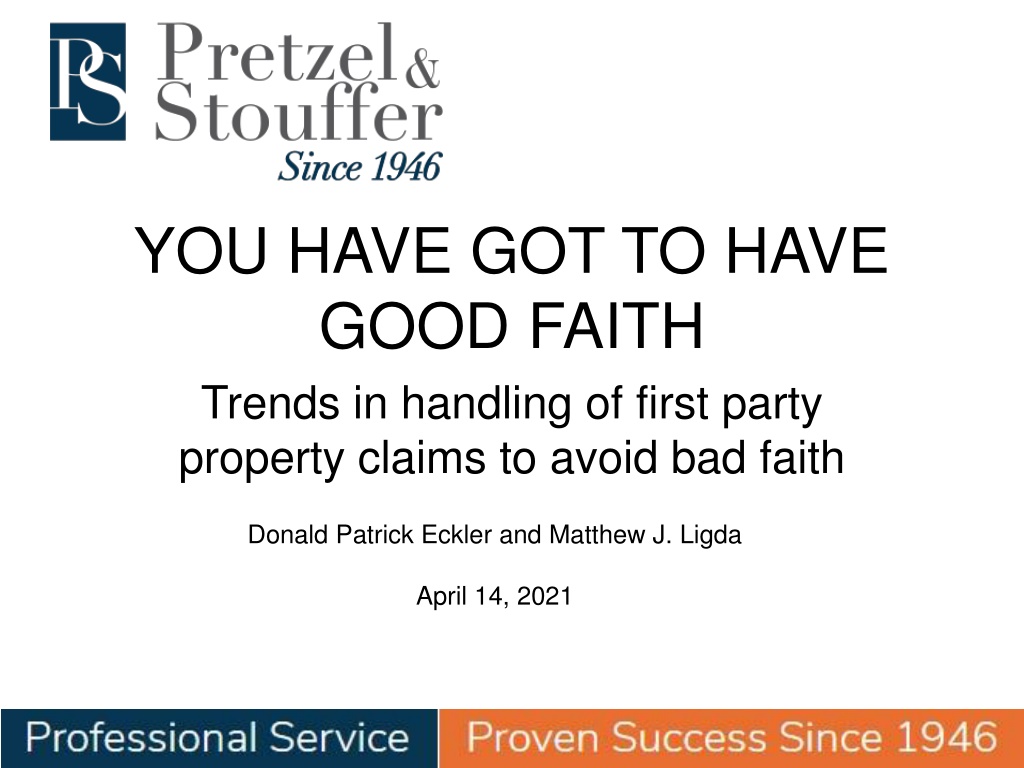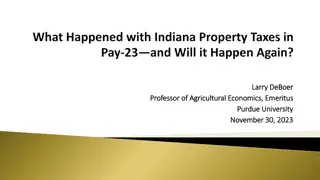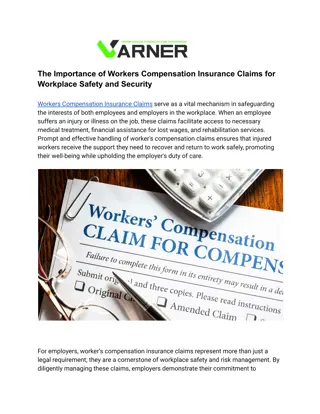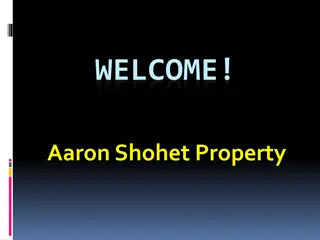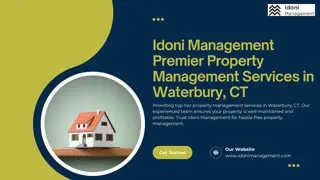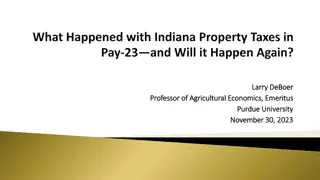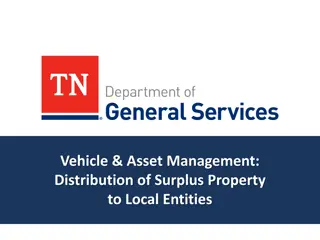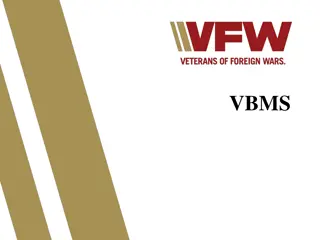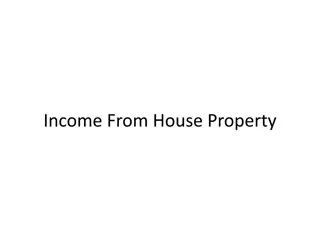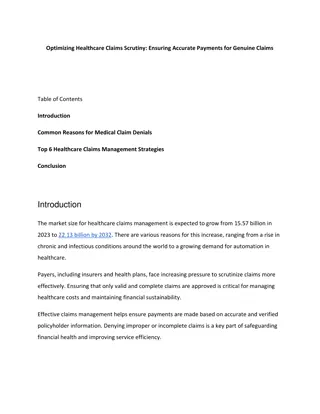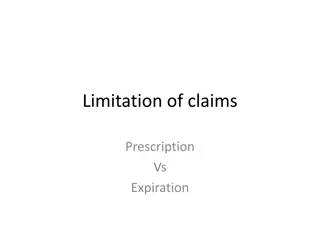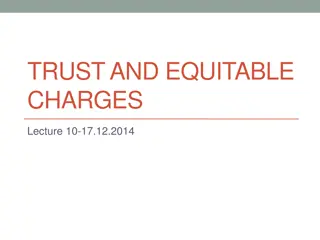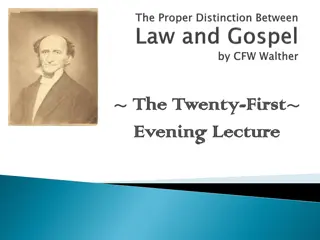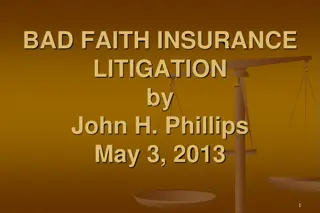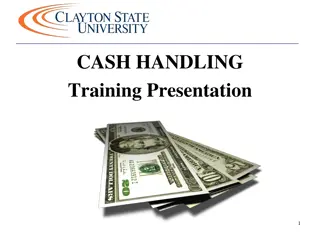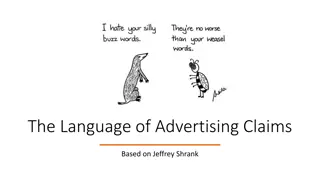Understanding and Avoiding Bad Faith in Handling Property Claims
This content delves into the concept of bad faith in handling first-party property claims, emphasizing the importance of good faith practices to prevent legal issues. It discusses relevant statutes, regulations related to Good Faith, and insights on bad faith under Section 155. The text highlights that an insurer's attitude and conduct play a crucial role in determining bad faith, emphasizing the need to handle claims with fairness and integrity.
Download Presentation

Please find below an Image/Link to download the presentation.
The content on the website is provided AS IS for your information and personal use only. It may not be sold, licensed, or shared on other websites without obtaining consent from the author. Download presentation by click this link. If you encounter any issues during the download, it is possible that the publisher has removed the file from their server.
E N D
Presentation Transcript
YOU HAVE GOT TO HAVE GOOD FAITH Trends in handling of first party property claims to avoid bad faith Donald Patrick Eckler and Matthew J. Ligda April 14, 2021
Statutes and Regulations Related to Good Faith 215 ILCS 5/155 - applies to litigation only 215 ILCS 5/154.5 215 ILCS 5/154.6 Illinois Administrative Code, Title 50, Chapter 1, Subchapter 1, Part 919 Essentially, these are all the Golden Rule.
What is bad faith under Section 155? The text of Section 155 is: In any action by or against a company wherein there is in issue the liability of a company on a policy or policies of insurance or the amount of the loss payable thereunder, or for an unreasonable delay in settling a claim, and it appears to the court that such action or delay is vexatious or unreasonable, the court may allow as part of the taxable costs in the action reasonable attorney fees.
What is bad faith under Section 155? In determining whether an insurance company has been vexatious and unreasonable, the court looks to the totality of the circumstances and not a single factor but it is the attitude of the defendant which must be examined. Green v. International Insurance Company, 238 Ill. App. 3d 929, 935 (2nd Dist. 1992) (emphasis added). An attitude by an insurer which is not only vexatious, but irritating, exasperating, and provoking support relief under Section 155. Deverman v. Country Mutual Insurance Company, 56 Ill .App. 3d 122, 124 (4th Dist. 1978). In dealing with insureds on first-party claims, claimants and claimants counsel on third-party claims, you can disagree, but you can t be disagreeable.
What is bad faith under Section 155? It is well settled that assertions of legitimate policy defenses and denials based on a policy s express wording are inappropriate for invoking Section 155. Scudella v. Illinois Farmers Insurance Co., 174 Ill. App.3d 245, 255 (1st Dist. 1988); see also, Cummings Foods, Inc. v. Great Central Insurance Co., 108 Ill. App.3d 250 (4th Dist. 1982). A bona fide dispute is one that is [r]eal, actual, genuine, and not feigned. Illinois Founders Insurance Co. v. Williams, 2015 IL App (1st) 122481, 33, quoting McGee v. State Farm Fire & Casualty Co., 315 Ill. App. 3d 673, 683 (2nd Dist. 2000), quoting Black's Law Dictionary 177 (6th ed. 1990)). In fact, where an insurer reasonably relie[s] upon evidence sufficient to form a bona fidedispute, that insurer has not acted unreasonably or vexatiously under section 155. Id.
What is Section 154.5? It is an improper claims practice for any domestic, foreign or alien company transacting business in this State to commit any of the acts contained in Section 154.6 if: (a) it is committed knowingly in violation of this Act or any rules promulgated hereunder; or (b) It has been committed with such frequency to indicate a persistent tendency to engage in that type of conduct.
What is Section 154.6? Acts constituting improper claims practice. Any of the following acts by a company, if committed without just cause and in violation of Section 154.5, constitutes an improper claims practice: (a) Knowingly misrepresenting to claimants and insureds relevant facts or policy provisions relating to coverages at issue; (b) Failing to acknowledge with reasonable promptness pertinent communications with respect to claims arising under its policies;
What is Section 154.6? (e) Compelling policyholders to institute suits to recover amounts due under its policies by offering substantially less than the amounts ultimately recovered in suits brought by them; (h) Refusing to pay claims without conducting a reasonable investigation based on all available information; (i) Failing to affirm or deny coverage of claims within a reasonable time after proof of loss statements have been completed; (j) Attempting to settle a claim for less than the amount to which a reasonable person would believe the claimant was entitled, by reference to written or printed advertising material accompanying or made part of an application or establishing unreasonable caps or limits on paint or materials when estimating vehicle repairs;
Can Section 154.6 Be Used to Advance a 155 Claim? Maybe. Section 154.6 [of the Insurance Code] lists acts committed by an insurance company that constitute improper claims practices. Area Erectors, Inc. v. Travelers Property Casualty Co. of America, 2012 IL App (1st) 111764, 30. Section 154.6 is regulatory in nature and does not give rise to a private remedy or cause of action by a policyholder against an insurer. Id. However, a private cause of action does exist under section 155 of the Illinois Insurance Code. Id. 31.
Can Section 154.6 Be Used to Advance a 155 Claim? Allegations that an insurer misled the insured about the contents of his policy, inadequately investigated his claim, refused to negotiate in good faith, refused to participate in the appraisal process in good faith and delayed payment after the appraisal process was complete are sufficient to state a claim under Section 155. See McGee v. State Farm Fire & Casualty Co., 315 Ill. App. 3d 673, 681-82 (2000); see also Markel American Insurance Co. v. Dolan, 787 F. Supp. 2d 776, 779 (N.D. Ill. 2011).
Can Section 154.6 Be Used to Advance a 155 Claim? Some of the acts described in section 154.6 are illustrative of conduct by an insurer that may give rise to a remedy for vexatious and unreasonable conduct under section 155. Zagorski v. Allstate Insurance Co., 2016 IL App (5th) 140056, 26.
Can Section 154.6 Be Used to Advance a 155 Claim? In Kamin v. Country Casualty Insurance Company, 2021 IL App (3d) 190275, the court affirmed the dismissal of the bad faith claim brought by the insured because the plaintiff simply pled conclusory allegations of breach of Section 154.6 to support their Section 155 claim. It seems that if they had pled facts the dismissal may have been reversed.
Kamin v. Country Casualty Insurance Company In misrepresentations made by the insured about his use of a barn that was used and the whether he had been behind on his mortgage in the last five years. He contended, successfully, at trial that though he was wrong he did not lie. Depending on the policy language it is usually not enough to have a misrepresentation by the insured, the insurer usually has to show willfulness by the insured. Kamin, the insurer denied coverage based upon
Dealing with policy limit and excess demands Have a bona fide basis to dispute coverage or extent of coverage, or both. If an insurer refuses all benefits sought under a policy while objecting only to coverage for some of the benefits, it will be susceptible to a finding that it violated Section 155. See Millers Mut. Ins. Ass n v. House, 286 Ill.App.3d 378 (5th Dist. 1997). In Hess v. Estate of Klamm, 2020 IL 124649, there was a dispute over the extent of liability coverage and the undisputed amount was paid and the remainder was litigated.
Manner to Handle Claims Analyze the claim material to determine available coverage positions, conduct the necessary investigation promptly. Be responsive to inquiries from claimants and counsel. If you do not have an answer immediately, send correspondence that you are investigating or analyzing their position and then get back to them. Irrespective of the disagreement, be courteous. Document. Document. Document. Take recorded statements and utilize examinations under oath.
Typical Issues in Bad Faith Property Claims Denials, Collapse, Late Notice - Wind and Hail, Code Upgrades, Mold. What to Do if a Bad Faith Claim is likely? If there are any questions as to causation or the extent of covered damages bring in a roofing or engineering expert. Avoid documenting opinions as to what is or is not covered until the investigation is complete. Reversal of prior opinions, even if preliminary can constitute Bad Faith. Consult an Attorney Exclusions: Design, wear and tear, decay hidden from view, prejudice to insurer, application of codes based on the extent of repair. All Factual Questions.
Where do we see Bad Faith Claims? Claims that are denied. Any value. Fact vs. Notice Pleading Collapse Claims high value catastrophic losses. Mostly roofing cases, many are bowstring truss buildings or buildings with cantilevered roofs. Late Notice Wind and Hail Usually roofing usually a PA is guiding the insured will frequently steer the insured to a Bad Faith Lawyer. Code Upgrades roofing or fire suppression engineer/architect involved for insured usually a PA. Mold less common usually a delay in repairs due to some other dispute
Causation Not all claims require experts. Some losses will be obvious and will not require expert review. Other losses are less obvious. When in doubt as to causation bring in an expert. Experts should document the alleged damages You can never have too many pictures. Experts provide a basis to allow or deny the claim. You will get accused of Bad Faith anyway.
Preliminary Opinions and Careful Claim Notes The hail damage total is $425,000. I think we should get an engineer to look at this one. This isn t covered lets bring in an engineer Regardless of what the claim handler meant with this statement or what the engineers ultimately find, these types of statements are going to be used as evidence of a bad faith attempt by the insurer to avoid a large loss or using the experts to backstop an off the cuff coverage position. Words do make a difference. The alleged damages , the disputed damages , the potential damages if causation is proven . causation is unclear , coverage is unclear.
Why Do I Want a Litigation Attorney? Most First Party Property Disputes Involve Questions of Fact That Can Not be Determined by a Dispositive Motion. Did the roof collapse due to: improper design? Decay hidden from view or in plain sight? Was wear and tear a factor? Was the insurer prejudiced by the delay in reporting the wind/hail damage? What is the extent of the repairs? Do they require code compliance? In a Bad Faith Claim they will depose Everyone. Who will sit next to me when I get deposed? What will I be asked?
Section 154.6 means you are not alone As the courts continue to expand the application of Section 154.6 to private causes of action for Bad Faith the insured s attorneys have expanded the scope of discovery. Section 155 tends to focus on the individual claim and how it was handled. Section 154.6 will focus on how the insurer handles types of claims. This changes the scope of discovery greatly making the insurer document and defend not only the single claim at issue but also the type of claim. Discovery based on the case of called Zagorski v. Allstate, 2016 IL App (5th) 140056 is becoming more popular as these cases advance.
penalties, or fines against [Company] pursuant to 215 ILCS 5/155? If so, state the following: During the last five years has any Illinois court assessed attorney s fees, costs, a. b. c. the case name, number, and jurisdiction; the amount of the fees, costs, penalties or fines; and whether the fees, costs, penalties or fines were a result of denial of a collapse loss claim. During the last five years has [Company] been sued in Illinois by any insured alleging it failed to pay a [collapse] loss claim? If so, state: a. b. c. d. e. the case name, number, and jurisdictions; the date the case was filed; the attorneys of records; whether the case was tried or settled; and the amount of any settlement or jury verdict.
During the last five years have any of [Company]s insureds made any claim with the Illinois Department of Insurance alleging improper claims handling practices regarding a collapse loss claim? If so, please state: a. b. c. the name and address of each claimant; the date each claim was filed; and the disposition of each claim.
Section 919.50: Required Practices for all Insurance Companies a) The company shall affirm or deny liability on claims within a reasonable time and shall offer payment within 30 days after affirmation of liability, if the amount of the claim is determined and not in dispute. For those portions of the claim which are not in dispute and for which the payee is known, the company shall tender payment within said 30 days. 1) On first party claims if a settlement of a claim is less than the amount claimed, or if the claim is denied, the company shall provide to the insured a reasonable written explanation of the basis of the lower offer or denial within 30 days after the investigation and determination of liability is completed. This explanation shall clearly set forth the policy definition, limitation, exclusion or condition upon which denial was based. Notice of Availability of the Department of Insurance shall accompany this explanation. 2) Within 30 days after the initial determination of liability is made, if the claim is denied, the company shall provide the third party a reasonable written explanation of the basis of the denial.
Matthew J. Ligda Pretzel-Stouffer, Chartered One South Wacker Suite 2500 Chicago, Illinois 60606 Tel: (312) 578-7442 mligda@pretzel-stouffer.com Donald Patrick Eckler Pretzel-Stouffer, Chartered One South Wacker Suite 2500 Chicago, Illinois 60606 Tel: (312) 578-7653 deckler@pretzel-stouffer.com
